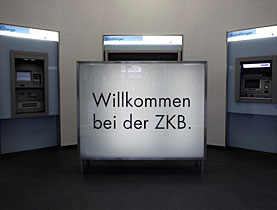Market fireworks light up Swiss front pages

The Swiss media have welcomed with relief Monday's record stock market increases, which came after European governments announced huge aid packages.
But alongside the grinning traders on front pages, the papers grappled with the many “buts” and unanswered questions: who was going to pay for all of this? What strings are attached? Why is the Swiss government conspicuous by its silence?
“Breathe out!” ordered the tabloid Blick in its headline. “Phew, that was close,” it continued, “but who is going to pay for all of this?”
Ultimately it was going to be the taxpayer, it said. “The bank managers are happy – it’s not their money.”
Banks were the biggest winners on Monday, when the Swiss stock market index posted the largest single-day gain in its 20-year history, closing 11.39 per cent higher at 5,956 points. Credit Suisse for example saw its shares soar nearly 28 per cent.
The boost comes after several European countries, including Germany, Britain and France, announced huge financial aid packages worth nearly €2 trillion (SFr3.1 trillion).
By contrast, the Swiss government has not agreed a rescue package for its banks.
“The world is not going to go under”, was the headline of Der Bund in the Swiss capital, Bern, which went on to describe Switzerland as a “free-loader” in this affair.
Similarly, Le Temps in Geneva welcomed the “decisive action” taken by European governments, but noted that the Swiss government “can rub its hands”.
“The [Swiss government] benefits directly from the European action without spending a single centime,” it said. “All this while the bank most affected by the subprime crisis [UBS] sits in Zurich.”
Free lunch?
Le Temps reminded its readers however that there was no such thing as a free lunch and a bill will arrive on the table in Bern sooner or later in one form or another.
The Tages-Anzeiger in Zurich said that in return for wrapping up this rescue package, European governments would demand a say in future banking decisions concerning “strategy, management pay and dividend distribution”.
The “concerted action” had laid the ground for stabilisation, according to the Neue Zürcher Zeitung, which tipped its hat, like many other papers, to British Prime Minister Gordon Brown, whose action during the crisis has bolstered his political standing at home.
“Stock market fireworks thanks to state help,” was the headline in the Basler Zeitung, which also noted that while European governments were flinging lifebelts to their respective economies, Switzerland was remaining noncommittal.
“And that’s how it should be,” the paper said. “For the Swiss government to throw taxpayers’ money, in billions, at bad assets of dodgy banks – as we’ve seen abroad – would be simply unacceptable.”
The time for reticence and laissez-faire politics was over, it added: what was now needed was crash barriers, rules and guarantees.
Cautious optimism
On Tuesday the Swiss Market Index of the 20 top companies continued its upward trajectory, closing 5.1 per cent up at 6,260.22 points.
Der Bund reflected the general air of cautious optimism.
“The good news is that because companies are now expected to turn in profits, shares are currently significantly undervalued; the bad news is that these profit expectations can always collapse. In the heat of a crisis, tips involving undervalued shares can often go up in smoke.”
swissinfo, Thomas Stephens
Switzerland confirmed on Monday that it does not need to follow the example of many other countries that have raised massive amounts of taxpayers’ money to bail out stricken banks.
Following the United States’ $700 billion (SFr790 billion) rescue package earlier this month, Britain announced a £37 billion (SFr73 billion) cash injection while Germany was poised to prop up its ailing financial system with a €470 billion (SFr724 billion) hand out.
Spain said it would provide up to €100 billion of guarantees for new debt issued by commercial banks in 2008. Norway and Portugal have also followed suit with their own bail out cash packages.
Germany, New Zealand and the United Arab Emirates are the latest countries to guarantee all bank deposits.
A finance ministry spokeswoman said Switzerland had no immediate plans to launch a state bail out. “We welcome all the measures taken by the G7 states, the European Union and individual governments as a valuable contribution to stabilising the financial markets,” Tanja Kocher said.

In compliance with the JTI standards
More: SWI swissinfo.ch certified by the Journalism Trust Initiative












You can find an overview of ongoing debates with our journalists here . Please join us!
If you want to start a conversation about a topic raised in this article or want to report factual errors, email us at english@swissinfo.ch.